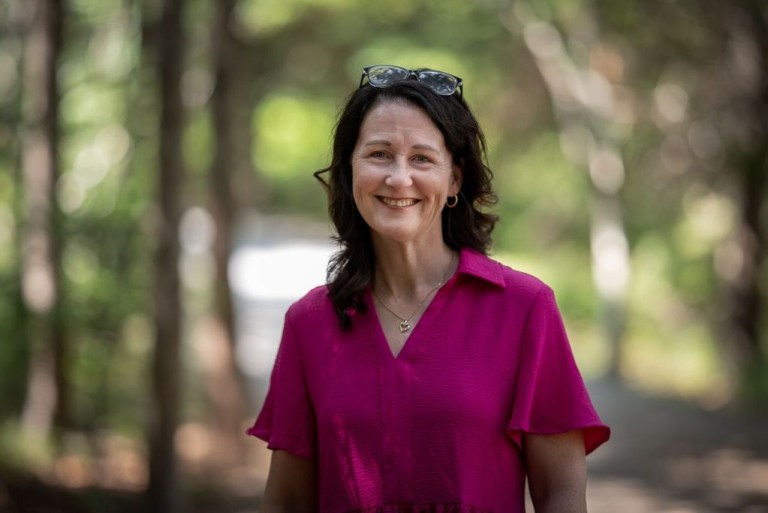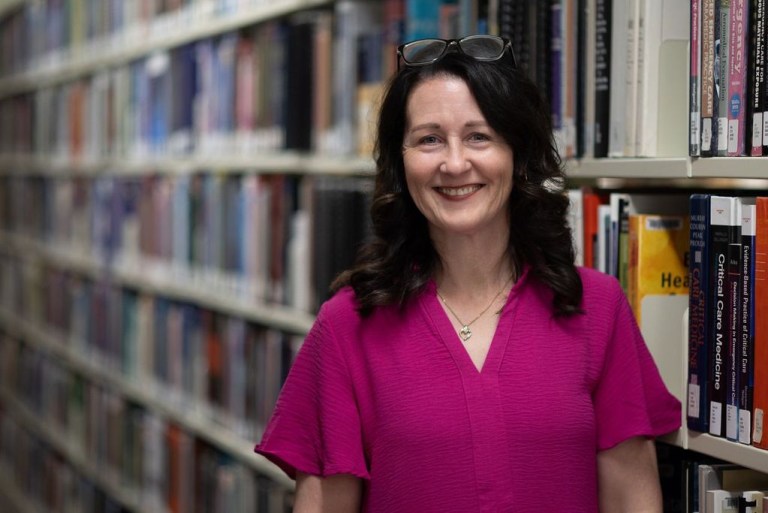Aug. 11, 2025
When Dr. Renee Crossman was diagnosed with Type 1 diabetes at age 31, her entire world shifted.
 Renee Crossman has given thousands of insulin injections, but the first time she had to inject herself, it took five minutes. “I was frightened. I was just Renee.”
Renee Crossman has given thousands of insulin injections, but the first time she had to inject herself, it took five minutes. “I was frightened. I was just Renee.”
Photo: Rich Blenkinsopp
Already an experienced nurse teaching in Memorial University’s Faculty of Nursing, she suddenly found herself confronted by a disease she knew quite well from textbooks and past nursing experience but now had to navigate personally.
“I had given thousands of insulin injections,” Dr. Crossman said candidly. “But the first time I had to inject myself, it took me five minutes. I was frightened. I was just Renee — and I was scared.”
That pivotal moment catalyzed for her what would eventually become an impactful career in diabetes research.
But it also sparked something deeply personal: a commitment to challenge the stigma, misunderstandings and immense pressures faced daily by individuals living with diabetes.
Diabetes in N.L.: a rising crisis
Diabetes is a growing health crisis in this province: 33 per cent of the population lives with diabetes or prediabetes.
According to Diabetes Canada, the projected rise in Newfoundland and Labrador diabetes cases is expected to grow from 67,900 people in 2024 to 81,250 in 2034.
This growth significantly stresses families, with annual out-of-pocket expenses ranging dramatically from $520 to $9,169 for Type 1 diabetes management alone.
Direct health-care costs to the province are projected at $83 million this year.
These sobering statistics frame Dr. Crossman’s work in a broader context.
But for her, it always comes back to the individual experience: 24 hours a day, 365 days a year.
Diabetes never takes a day off — and neither can the individual.
“People really appreciate being viewed and interacted with as the expert in their body.” — Dr. Renee Crossman
The relentless nature of diabetes became the focus of her doctoral dissertation, Living with a Machine: A Critical Focused Ethnography of Diabetes Practices in the Context of Insulin Pumps, which earned her the prestigious Genevieve Grey Medal in Nursing from the University of Alberta.
Building on this foundation, Dr. Crossman and her team members recently received two major research grants from the Canadian Institutes of Health Research (CIHR), Canada’s federal funding agency for health research.
In October 2024, she was co-principal investigator with a team on a CIHR Operating Grant: Knowledge Mobilization in Diabetes Prevention and Treatment, a national competition that supports the integration of research evidence into health services, programs and policies.
The $124,355 grant supports the project Freedom and Flexibility – Communicating the Experiences of Beta Cell Replacement to Patients and Providers, which focuses on sharing the lived experiences of islet transplant recipients and improving communication between patients and care teams.
 While Dr. Renee Crossman’s insurance covers the cost of her needles, she’s talked with individuals who do not have insurance and are forced to reuse needles, risking infection.
While Dr. Renee Crossman’s insurance covers the cost of her needles, she’s talked with individuals who do not have insurance and are forced to reuse needles, risking infection.
Photo: Rich Blenkinsopp
In March 2025, along with a team of patient partners, researchers and clinicians, Dr. Crossman was awarded a CIHR Catalyst Grant as the lead investigator for a study titled Exploring Access to Diabetes Care and Support in Atlantic Canada: The Intersection of Places, Perspectives, and Policies (3P Diabetes Access).
This work aims to better understand and improve access to diabetes care across Atlantic Canada, particularly in rural and underserved communities.
From blame to lived experience
Dr. Crossman’s research highlights how diabetes care can better integrate patients’ lived experiences rather than placing sole responsibility — and sometimes blame — on the individuals managing the disease.
Patients struggle to meet biomedical benchmarks.
She says patient-centred care is very well-intentioned and focusing on the person is “absolutely needed” in diabetes care, but because of the consistent and continued centring of the individual, blame, shame and stigma can be centred on the patient, as well.
“I advocate continuing the conversation about using the term person-centred care and its implications for diabetes management, both positive and negative,” Dr. Crossman said. “We must consider the pressure placed on the individual as the perceived sole driver of their management and acknowledge there’s so much more going on, outside of their control.”
Listening to the experts: people living with diabetes
Her current research includes a province-wide project involving interviews and focus groups to explore interactions between individuals living with diabetes and their health-care providers.
She has noticed a striking theme from these conversations.
“People really appreciate being viewed and interacted with as the expert in their body,” said the nursing scholar. “They appreciate health-care providers who genuinely ask, ‘How is diabetes affecting your life?’ instead of beginning an appointment with a focus on numbers.”
In the words of one of Dr. Crossman’s research participants:
“. . . everybody can see it from the outside, but we live with this every day, and nobody sees what we’re going through [on the inside]. So, it’s kind of hard . . . People don’t get it.”
Dr. Crossman says this approach is not just empathetic; it’s also practical, considering the complex challenges faced by individuals with diabetes, from emotional and psychological burdens to the tangible costs of medical supplies.
“I recently paid $900 for insulin pump supplies, and I’m fortunate because I have insurance,” she said. “But many people can’t. I’ve talked with individuals forced to reuse needles, risking infections, simply because they couldn’t afford new ones.”
Meaningful dialogue: fostering community
Dr. Crossman believes her research is opening meaningful dialogues and fostering community.
Aiming to improve support for both patients and health-care providers, she is helping to rethink diabetes management assessment tools and how to simultaneously prioritize patient experiences and biomedical markers.
Ultimately, she is focused on helping individuals who live with diabetes and those who support them.
“If my research can help improve diabetes management somehow, I think that’s a win.”
To learn more, contact crossman@mun.ca, call (709) 864-4459 or connect with research assistant Olivia Riley at oriley@mun.ca.

